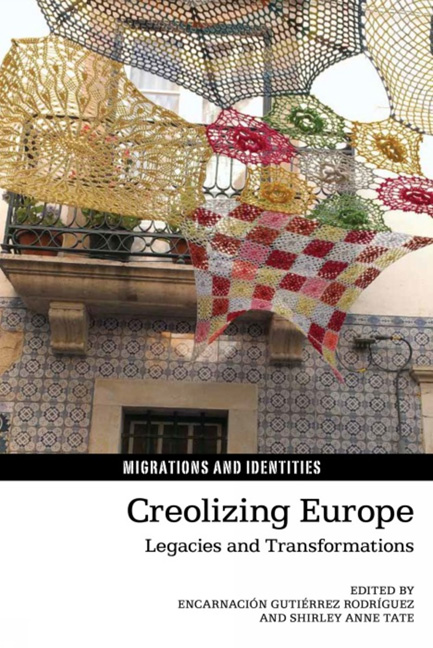Book contents
- Frontmatter
- Dedication
- Acknowledgements
- Contents
- List of Figures
- List of Contributors
- Introduction: Creolizing Europe: Legacies and Transformations
- 1 Creolité and the Process of Creolization
- 2 World Systems and the Creole, Rethought
- 3 Creolization and Resistance
- 4 Continental Creolization: French Exclusion through a Glissantian Prism
- 5 Archipelago Europe: On Creolizing Conviviality
- 6 Are We All Creoles? ‘Sable-Saffron’ Venus, Rachel Christie and Aesthetic Creolization
- 7 Re-imagining Manchester as a Queer and Haptic Brown Atlantic Space
- 8 Queering Diaspora Space, Creolizing Counter-Publics: On British South Asian Gay and Bisexual Men's Negotiations of Sexuality, Intimacy and Marriage
- 9 On Being Portuguese: Luso-tropicalism, Migrations and the Politics of Citizenship
- 10 Comics, Dolls and the Disavowal of Racism: Learning from Mexican Mestizaje
- 11 Creolizing Citizenship? Migrant Women from Turkey as Subjects of Agency
- Index
9 - On Being Portuguese: Luso-tropicalism, Migrations and the Politics of Citizenship
- Frontmatter
- Dedication
- Acknowledgements
- Contents
- List of Figures
- List of Contributors
- Introduction: Creolizing Europe: Legacies and Transformations
- 1 Creolité and the Process of Creolization
- 2 World Systems and the Creole, Rethought
- 3 Creolization and Resistance
- 4 Continental Creolization: French Exclusion through a Glissantian Prism
- 5 Archipelago Europe: On Creolizing Conviviality
- 6 Are We All Creoles? ‘Sable-Saffron’ Venus, Rachel Christie and Aesthetic Creolization
- 7 Re-imagining Manchester as a Queer and Haptic Brown Atlantic Space
- 8 Queering Diaspora Space, Creolizing Counter-Publics: On British South Asian Gay and Bisexual Men's Negotiations of Sexuality, Intimacy and Marriage
- 9 On Being Portuguese: Luso-tropicalism, Migrations and the Politics of Citizenship
- 10 Comics, Dolls and the Disavowal of Racism: Learning from Mexican Mestizaje
- 11 Creolizing Citizenship? Migrant Women from Turkey as Subjects of Agency
- Index
Summary
Introduction
Social sciences have borrowed the term creolization from linguists who tracked the emergence of new languages from two or more pre-existing languages. Although a fluid concept, creolization generally refers to the socio-cultural results of the interaction between African slaves, European settlers, Asian indentured workers and indigenous peoples. Cultural creolization, understood as the intermingling and mixing of two, or several, formerly discrete traditions or cultures, has been applied to societies such as Louisiana, Jamaica, Trinidad and Tobago, Réunion and Mauritius (Spitzer 2003; Eriksen 2007). Ever since the word was coined by the Portuguese and Spanish explorers during the sixteenth century, creole (crioulo in Portuguese) and creolization have meant different things in different times and places (Stewart 2007). For example, today, while crioulo refers to the official language in Cape Verde, it has come to mean also Cape Verdean identity and culture.
If we think about this usage of creolization as identity and culture, Portugal has had a creolized past and continues to have a creolized present. However, in Portugal, the terms miscigenação and mestiçagem are more commonly used in preference to creolization to refer to cultural and racial mixing and thhave been at the center of the debates on national identity for most of the twentieth century. As will be discussed in this chapter, much debate has been generated by Gilberto Freyre's work on Luso-tropicalism, a term that has been employed to analyze racial and cultural mixing in the wider Portuguese-speaking context (Caldeira, 1993; Venâncio, 2000; Vale de Almeida, 2007), just as creolization has been used to analyze societies in the Caribbean and elsewhere. Creolization emphasizes constant contact, creative interplay and transformation in the societies, cultures and bodies that are its result (Hannerz, 1992; Boisvert, 2005), and one of the main ideas behind Freyre's work on Luso-tropicalism was the appreciation and normalization of miscegenation (Venâncio, 2000). As Riesz (2000, 105) puts it, Luso-tropicalism is a ‘rehabilitation and appreciation of the indigenous and African contribution to the Brazilian nation and culture’, in what could be seen as a ‘contraposition to a colonial way of writing history which highlights the white and European contribution’.
- Type
- Chapter
- Information
- Creolizing EuropeLegacies and Transformations, pp. 157 - 174Publisher: Liverpool University PressPrint publication year: 2015



